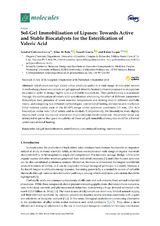Sol-Gel Immobilisation of Lipases: Towards Active and Stable Biocatalysts for the Esterification of Valeric Acid
Autor
Cebrián-García, Soledad
Balu, Alina M.
García, Araceli
Luque, Rafael
Editor
MDPIFecha
2018Materia
Sol-gel biosilicificationEsterification
Conventional heating
Microwaves
METS:
Mostrar el registro METSPREMIS:
Mostrar el registro PREMISMetadatos
Mostrar el registro completo del ítemResumen
Alkyl esters are high added value products useful in a wide range of industrial sectors.
A methodology based on a simple sol-gel approach (biosilicification) is herein proposed to encapsulate
enzymes in order to design highly active and stable biocatalysts. Their performance was assessed
through the optimization of valeric acid esterification evaluating the effect of different parameters
(biocatalyst load, presence of water, reaction temperature and stirring rate) in different alcoholic
media, and comparing two different methodologies: conventional heating and microwave irradiation.
Ethyl valerate yields were in the 80–85% range under optimum conditions (15 min, 12% m/v
biocatalyst, molar ratio 1:2 of valeric acid to alcohol). Comparatively, the biocatalysts were slightly
deactivated under microwave irradiation due to enzyme denaturalisation. Biocatalyst reuse was
attempted to prove that good reusability of these sol-gel immobilised enzymes could be achieved
under conventional heating.

